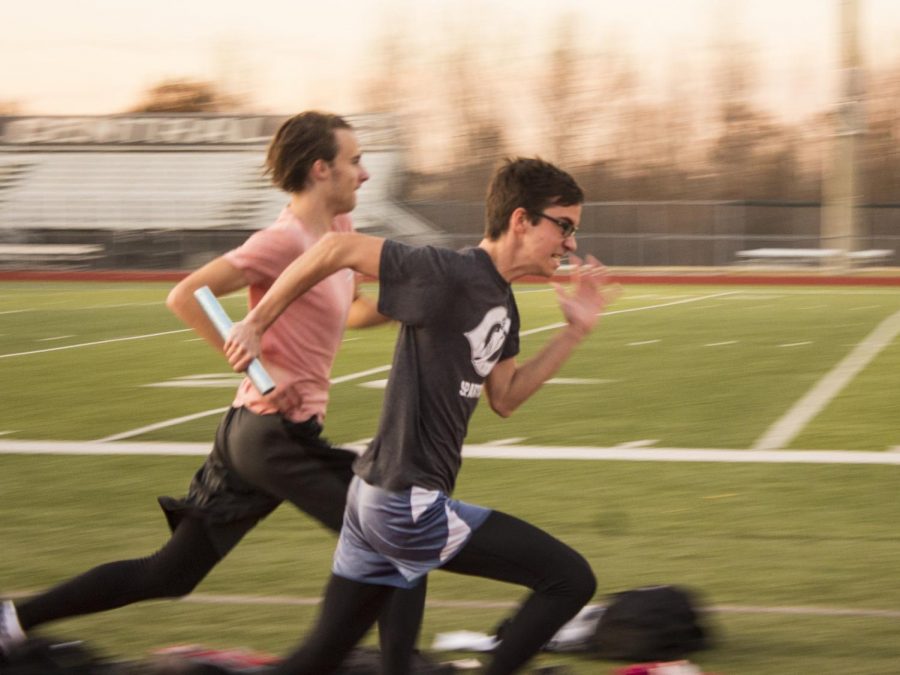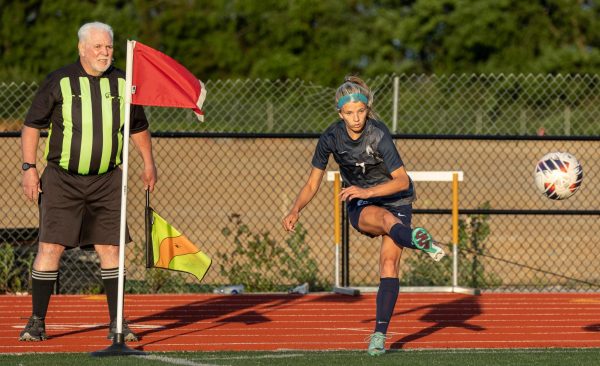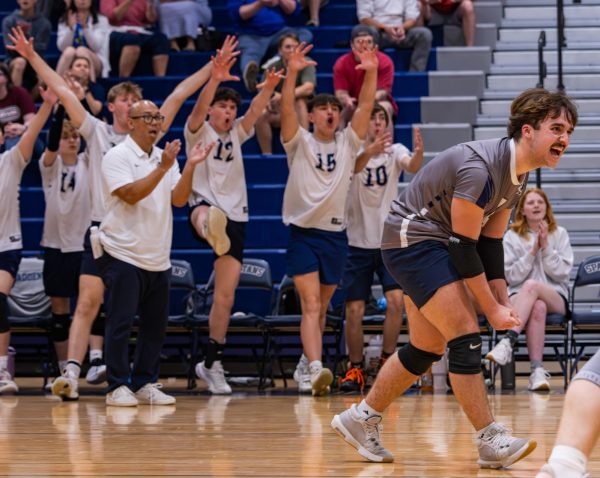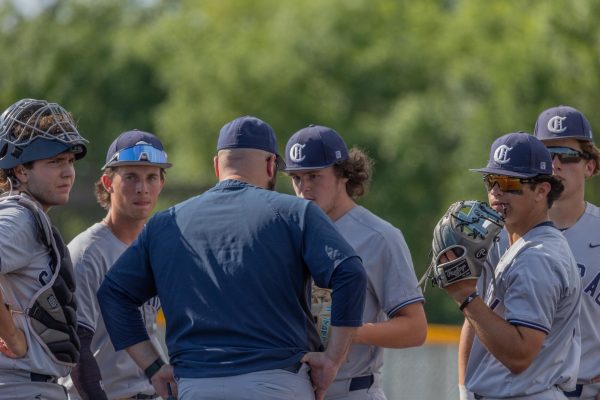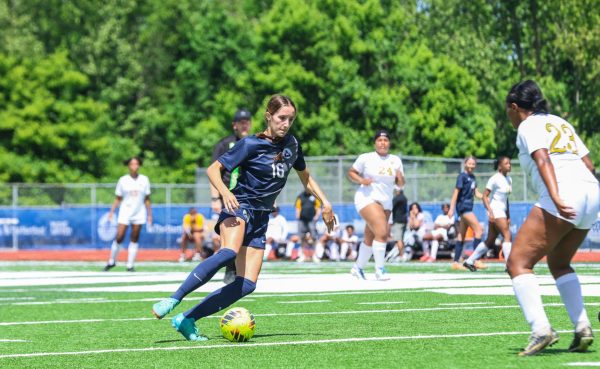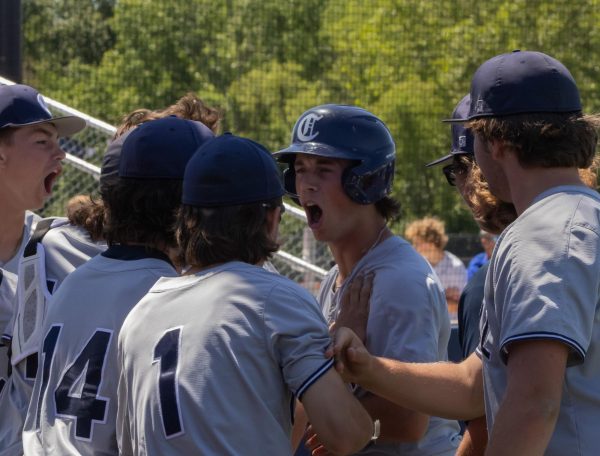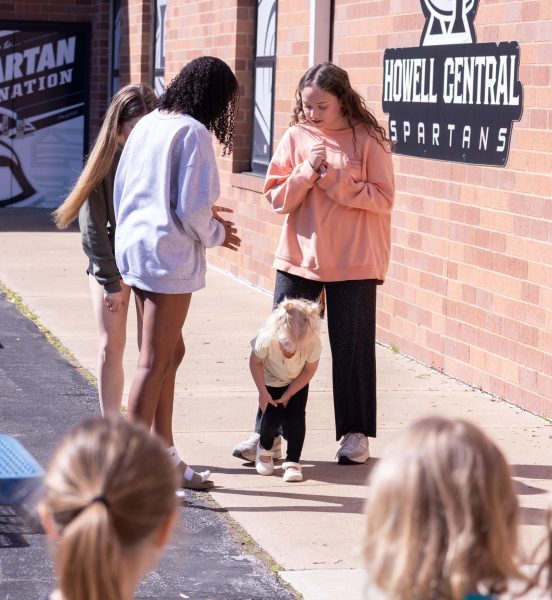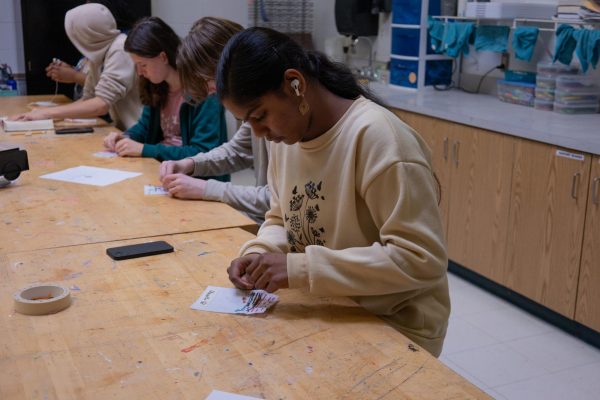Relentless. Impassioned. Immortal.
Small group of runners practices every day after school, no matter the weather. Their goal? To make each other better.
OFF-SEASON SPRINTING: Eli Allen and Reed Easterling perform handoffs with a baton. “My biggest goal is just to stay in shape and to get myself better so that during track season I can get better and better times,” Easterling said.
The first snow of the year falls to the ground, a thick flurry of white, fluffy flakes blowing through the air. The hallways clear out and fall silent as hundreds of teenagers quickly rush to their transportation, desperate to get out of the frigid temperatures and the cold, slushy snow that cascades onto heads covered with hands, jackets and binders. Though all activities and practices have been cancelled due to the inclement weather, a select group of students — runners — prepares to face the unforgiving conditions head-on. The Immortals, a winter training group comprised of cross country and track runners, layer up in their finest cold-weather gear, ready, excited even, to face the environment many of their peers are reluctant to confront.
The group, headed by senior Eli Allen, meets every weekday after school for a combination of cardio, strength workouts and stretching. Unlike other winter training groups, the Immortals are completely student-led. They have no sponsor to oversee practices, no coach to arrange workouts, no authority figure to keep them in check. The only leadership they receive comes from one another, the only motivation from themselves.
“We don’t have an official winter group school sponsor, and the coaches do put up workouts in January,” Allen said. “But I feel that those workouts are posted too late, and not enough people do them because there’s not a whole lot of organization. The real benefit of [them] is undermined.”
Though the group isn’t widely known or recognized, it isn’t from lack of dedication or longevity. The Immortals were founded in 2014 by Allen’s older brother, Garrett Allen, as an attempt to keep in shape for the quickly approaching track season. The name, coined by the older Allen brother, was inspired by a fierce group of soldiers.
“The name comes from an ancient group of Persian soldiers called the Immortals. They were the only Persian guard at the time and they were, ironically, the only group in battle that could stand up and slaughter the Spartans,” Eli explained. “[We also have] the mentality that what we do would be immortally cast into our lives as something that would forever make us better runners and people.”
Though the triumph over Spartans isn’t applicable to the FHC Immortals, their dedication does, in some ways, parallel that of their namesake — their unwavering dedication, their unmatched perseverance. What the Immortals do is a feat not achieved by many: putting themselves in unbearable conditions, actively welcoming an unforgivable environment and happily pushing through until the end.
Junior Jackson Ford, assistant-coach and member of three years, feels the intense devotion of the Immortals with each practice he attends, and admires Allen’s resolute determination.
“[Eli] is very determined. It makes him a good leader in the fact that he’s constantly persevering to run, even when we probably shouldn’t,” Ford said.
The Immortals are intensely invested in their training routine for the track pre-season, and with conditions including below-freezing temperatures, bone-chilling winds and the occasional flurry of snow, preparation is key to remaining as comfortable and safe as possible. Being unprepared can be detrimental for the group, especially because of their adamant willingness to endure harsh and, at times, dangerous conditions.
Ford recalls a time last year when Allen forgot to bring gloves and ran anyway, despite the below-freezing temperatures he had to endure.
“He ran in 18 degree weather and he almost got frostbite on his hands, because he didn’t run with gloves,” Ford said.
With this experience in mind, Allen rarely neglects to prepare for the conditions he’ll be facing, even keeping in mind the group he leads as he packs his gear for the next day; bringing extra hats and gloves and sending reminders to the Immortals GroupMe to prepare for practice.
Even with proper preparation, running in the winter is still physically demanding. Ford said that the cold air is incredibly taxing on a runner’s throat, nose and lungs.
“It’s really just the breathing because you’re constantly sniffling from the cold air and you’re very compacted because you have a lot of tight clothing on to kind of keep that warmth,” Ford said. “It’s really cold and it’s a lot of pain. Every year I’ve gotten some sort of bacterial infection in my lungs.”
Despite the harsh environment, pre-season training allows the Immortals to acclimate themselves to the conditions they’ll be facing during the track season, as well as making their bodies more resilient to injuries that other athletes may be afflicted by.
“The time I have spent in the winter running really helps to prevent injury that has plagued other athletes who have injured themselves and lost their senior season in the past,” Allen said.
Junior Reed Easterling, an Immortals member and varsity cross country and track runner, believes winter training is difficult because of the severe conditions, but acknowledges the importance of off-season training; it gives him an advantage over other runners whose seasons will begin months after the Immortals started practicing.
“It really helps us because that way we don’t we don’t start at zero like the other athletes do,” Easterling explained. “By the time track season starts, we can get more into it and start off the season going faster [and] compete with the other schools that do have winter training.”
Off-season training also gives the Immortals a space where they can establish goals for themselves and grow closer to like-minded people, and an opportunity to push themselves and each other to become better runners.
“I hate to run by myself, as do most people, so having people there with me to push me and pushing them really helps because track is a much more closely bonded sport,” Allen said. “It’s almost essential that you run with people so that you don’t let yourself down.”
Another benefit provided by the Immortals is the opportunity to strengthen the bond between teammates; spending so much time with one group of people is bound to lead to a degree of closeness, and in the case of the Immortals, this closeness is an incredibly appealing attribute.
“It’s all sort of a friend group as well, so basically we bond really well and we get a lot more time alone with each other to sort of… talk and have fun and stuff,” Easterling said.
The camaraderie provided by the Immortals is one of its best aspects, according to Ford. Because of the Immortals, Ford gets an escape from the stresses of everyday life, a place to spend time with the people he cares about.
“It kind of shows me like what my close friend group is because the people who are part of the Immortals are people that I hang out with all the time,” Ford said. “It gives me an excuse to not do my homework and hang out with other people, really.”
According to Allen, running in the winter is a way to stay in shape both mentally and physically; it’s a way for athletes to rid themselves of the stress they face each day.
“I find running during stressful times like finals or the end of the quarter relieves my stress, and I find that I sleep better and eat better,” Allen said. “I think it’s always a good way to stay healthy during the winter and stay active so you’re not stuck indoors all day.”
Being a part of the Immortals offers many benefits, but the goal of each member is ultimately the same– becoming a better runner.
“My biggest goal is just to stay in shape and to get myself better so that during the track season I can get better and better times,” Easterling said.
Ford adds that though the main goal of the Immortals is to prepare for the upcoming track season, the group is open to anyone looking to improve their running or find something to do in the winter.
“[Our goal] is to get people prepared for that track season for those who are running track,” Ford said. “Even for people who aren’t running track, [it gives] them something to do because there’s not a whole lot of winter sports, so the Immortals is a way to just kind of keep in shape.”
Allen has many plans for improving and expanding the Immortals, including hopes to begin a weight room routine and incorporate more strength workouts into their practices.
“The goal, if we can, is to find a teacher or a sponsor who can take us into the weight room two or three times a week, so we can work on our fast twitch muscles in our legs and put bulk on our upper body and core, so that we’re more prepared to run faster shorter distances, which is what track surrounds,” Allen explained.
Though the Immortals’ attention falls into many different categories, from speed runs to proper stretching, they ultimately aim to bring in as many people as possible to have a productive season of bonding and personal improvement.
“I want to get a big group. And I want us to enter the season better than we left off last season,” Allen said. [Anyone] is more than welcome to join. If you’re a track athlete, come out and join us.”
Your donation will support the student journalists of Francis Howell Central High School. Your contribution will allow us to purchase equipment and cover our annual website hosting costs. FHCToday.com and our subsequent publications are dedicated to the students by the students. We hope you consider donating to allow us to continue our mission of a connected and well-informed student body.




